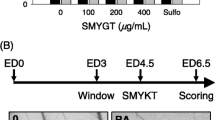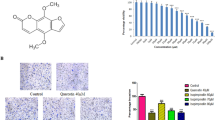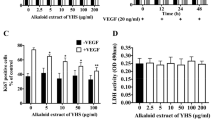Abstract
Objective
To investigate the anti-angiogenic effects of Pien Tze Huang (片仔癀, PZH) in vivo and in vitro.
Methods
Human umbilical vein endothelial cells (HUVECs) were treated with 0 mg/mL, 0.25 mg/mL, 0.5 mg/mL, and 1 mg/mL of PZH for 24 h, 48 h and 72 h, respectively. Chicken embryo chorioallantoic membrane (CAM) model was used to evaluate in vivo angiogenesis. An ECMatrix gel system was used to evaluate in vitro angiogenesis by examining the tube formation of HUVECs. 3-(4,5-dimethylthiazol-2-yl)-2,5-diphenyltetrazolium bromide assay was performed to determine HUVEC viability. Cell density of HUVECs was observed by phasecontrast microscopy. HUVEC migration was determined by wound healing method. The mRNA and protein expression of vascular endothelial growth factor A (VEGF-A) and basic fibroblast growth factor (bFGF) in both HUVEC and human colon adenocarcinoma cells (HT-29) was examined by reverse transcription polymerase chain reaction (RT-PCR) and enzyme linked immune sorbent assay (ELISA), respectively.
Results
PZH treatment significantly reduced the total number of blood vessels compared with the untreated control in the chicken embryos and resulted in a significant decrease in capillary tube formation and cell density of HUVECs (P<0.05). In addition, treatment with 0.25–1 mg/mL of PZH for 24 h, 48 h, and 72 h respectively reduced cell viability by 9%–52%, 24%–87% or 25%–87%, compared with the untreated control cells (P<0.05). Moreover, PZH treatment decreased the migration of HUVECs. Furthermore, PZH dose-dependently suppressed the expression of VEGF-A and bFGF on both mRNA and protein levels (P<0.05).
Conclusion
PZH could inhibit angiogenesis in vivo in CAM model and in vitro on HUVECs, suggesting that inhibiting tumor angiogenesis might be one of the mechanisms by which PZH treats cancer.
Similar content being viewed by others
References
Folkman J. Tumor angiogenesis: therapeutic implications. N Engl J Med 1971;285:1182–1186.
Folkman J. How is blood vessel growth regulated in normal and neoplastic tissue? G.H.A. Clowes memorial award lecture. Cancer Res 1986;46:467–473.
Folkman J, Shing Y. Angiogenesis. J Biol Chem1992;267:10931–10934.
Folkman J. Angiogenesis in cancer, vascular, rheumatoid and other diseases. Nat Med 1995;1:27–31.
Folkman J. Angiogenesis. Annu Rev Med 2006;57:1–18.
Jain RK. Transport of molecules in the tumor interstitium: a review. Cancer Res 1987;47:3039–3051.
Cook KM, Figg WD. Angiogenesis inhibitors: current strategies and future prospects. CA Cancer J Clin 2010;60:222–243.
Weidner N, Semple JP, Welch WR, Folkman J. Tumor angiogenesis and metastasis—correlation in invasive breast carcinoma. N Engl J Med 1991;324:1–8.
Breier G, Risau W. The role of vascular endothelial growth factor in blood vessel formation. Trends Cell Biol 1996;6:454–456.
Stromblad S, Cheresh DA. Integrins, angiogenesis and vascular cell survival. Chem Biol 1996;3:881–885.
Risau W. Mechanisms of angiogenesis. Nature 1997;386:671–674.
Jain RK. Tumor angiogenesis and accessibility: role of vascular endothelial growth factor. Semin Oncol 2002;29:3–9.
Ferrara N. Role of vascular endothelial growth factor in physiologic and pathologic angiogenesis: therapeutic implications. Semin Oncol 2002;29:10–14.
Ferrara N, Gerber HP, LeCouter J. The biology of VEGF and its receptors. Nat Med 2003;9:669–676.
Gille H, Kowalski J, Li B, LeCouter J, Moffat B, Zioncheck TF, et al. Analysis of biological effects and signaling properties of Flt-1 (VEGFR-1) and KDR (VEGFR-2). A reassessment using novel receptor-specific vascular endothelial growth factor mutants. J Biol Chem 2001;276:3222–3230.
Vlodavsky CR, Bråkenhielm E, Pawliuk R, Wariaro D, Post MJ, Wahlberg E, et al. Angiogenic synergism, vascular stability and improvement of hind-limb ischemia by a combination of “PDGFBB and FGF-2”. Nat Med 2003;9:604–613.
Presta M, Dell’Era P, Mitola S, Moroni E, Ronca R, Rusnati M. Fibroblast growth factor/fibroblast growth factor receptor system in angiogenesis. Cytokine Growth Factor Rev 2005;16:159–178.
Eikesdal HP, Kalluri R. Drug resistance associated with antiangiogenesis therapy. Semin Cancer Biol 2009;19:310–317.
Muñoz-Chápuli R, Quesada AR, Angel Medina M. Angiogenesis and signal transduction in endothelial cells. Cell Mol Life Sci 2 2004;61:2224–2243.
Zangari M, Fink LM, Elice F, Zhan F, Adcock DM, Tricot GJ. Thrombotic events in patients with cancer receiving antiangiogenesis agents. J Clin Oncol 2009;27:4865–4873.
Higa GM, Abraham J. Biological mechanisms of bevacizumabassociated adverse events. Expert Rev Anticancer Ther 2009;9:999–1007.
Chen HX, Cleck JN. Adverse effects of anticancer agents that target the VEGF pathway. Nat Rev Clin Oncol 2009;6:465–477.
Gordaliza M. Natural products as leads to anticancer drugs. Clin Transl Oncol 2007;9:767–776.
Ji HF, Li XJ, Zhang HY. Natural products and drug discovery. EMBO Reports 2009;10:194–200.
Zhao J, Jiang P, Zhang WD. Molecular networks for the study of TCM pharmacology. Brief Bioinform 2009;11:417–430.
Lin JM, Chen YQ, Wei LH, Chen XZ, Xu W, Hong ZF, et al. Hedyotis Diffusa Willd extract induces apoptosis via activation of the mitochondrion-dependent pathway in human colon carcinoma cells. Int J Oncol 2010;37:1331–1338.
Chinese Pharmacopoeia Commission. Pharmacopoeia of the People’s Republic of China. Beijing: Chinese Medical Science and Technology Press; 2010:573–575.
Xu YY, Yu EX. Clinical analysis of the effect of Pien Tze Huang in treatment of 42 patients with moderate or advanced liver cancer. Shanghai J Tradit Chin Med (Chin) 1994;12:4–5.
Gu ZX. Therapeutical observation of advanced colon cancer. Chin Tradit Patent Med (Chin) 1993;15:23.
Lin JM, Wei LH, Chen YQ, Liu XX, Hong ZF, Sferra TJ, et al. Pien Tze Huang-induced apoptosis in human colon cancer HT-29 cells is associated with regulation of the Bcl-2 family and activation of caspase 3. Chin J Integr Med 2011;17:685–690.
Author information
Authors and Affiliations
Corresponding author
Additional information
Surpported by the National Natural Science Foundation of China (No. 81073097), the Developmental Fund of Chen Ke-ji Integrative Medicine (No. CKJ 2011001), and the Natural Science Foundation of Fujian Province of China (No. 2010J01195)
Rights and permissions
About this article
Cite this article
Shen, Al., Hong, F., Liu, Ly. et al. Effects of Pien Tze Huang (片仔癀) on angiogenesis in vivo and in vitro . Chin. J. Integr. Med. 18, 431–436 (2012). https://doi.org/10.1007/s11655-012-1121-z
Received:
Published:
Issue Date:
DOI: https://doi.org/10.1007/s11655-012-1121-z




